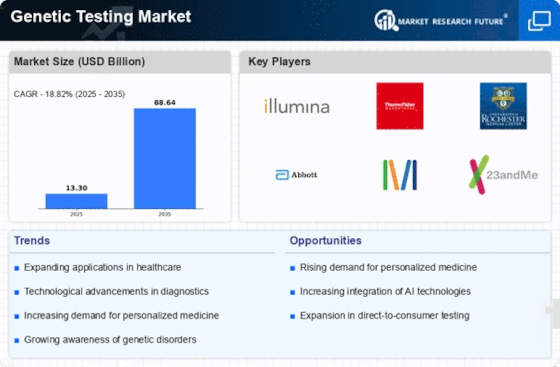Prenatal Testing
Newborn Screening
Carrier Testing
Diagnostic Testing
Predictive Testing
Single Gene Tests
Panel Tests
Whole Exome Sequencing
Whole Genome Sequencing
Non-Invasive Prenatal Testing
Laboratory Services
Diagnostic Services
Consultation Services
Hospitals
Clinical Laboratories
Research Institutions
Homecare Settings
North America
Europe
South America
Asia Pacific
Middle East and Africa
North America Outlook (USD Billion, 2019-2035)
North America Genetic Testing Market by Application Type
Prenatal Testing
Newborn Screening
Carrier Testing
Diagnostic Testing
Predictive Testing
North America Genetic Testing Market by Type
Single Gene Tests
Panel Tests
Whole Exome Sequencing
Whole Genome Sequencing
Non-Invasive Prenatal Testing
North America Genetic Testing Market by Service Type
Laboratory Services
Diagnostic Services
Consultation Services
North America Genetic Testing Market by End User Type
Hospitals
Clinical Laboratories
Research Institutions
Homecare Settings
North America Genetic Testing Market by Regional Type
US
Canada
US Outlook (USD Billion, 2019-2035)
US Genetic Testing Market by Application Type
Prenatal Testing
Newborn Screening
Carrier Testing
Diagnostic Testing
Predictive Testing
US Genetic Testing Market by Type
Single Gene Tests
Panel Tests
Whole Exome Sequencing
Whole Genome Sequencing
Non-Invasive Prenatal Testing
US Genetic Testing Market by Service Type
Laboratory Services
Diagnostic Services
Consultation Services
US Genetic Testing Market by End User Type
Hospitals
Clinical Laboratories
Research Institutions
Homecare Settings
CANADA Outlook (USD Billion, 2019-2035)
CANADA Genetic Testing Market by Application Type
Prenatal Testing
Newborn Screening
Carrier Testing
Diagnostic Testing
Predictive Testing
CANADA Genetic Testing Market by Type
Single Gene Tests
Panel Tests
Whole Exome Sequencing
Whole Genome Sequencing
Non-Invasive Prenatal Testing
CANADA Genetic Testing Market by Service Type
Laboratory Services
Diagnostic Services
Consultation Services
CANADA Genetic Testing Market by End User Type
Hospitals
Clinical Laboratories
Research Institutions
Homecare Settings
Europe Outlook (USD Billion, 2019-2035)
Europe Genetic Testing Market by Application Type
Prenatal Testing
Newborn Screening
Carrier Testing
Diagnostic Testing
Predictive Testing
Europe Genetic Testing Market by Type
Single Gene Tests
Panel Tests
Whole Exome Sequencing
Whole Genome Sequencing
Non-Invasive Prenatal Testing
Europe Genetic Testing Market by Service Type
Laboratory Services
Diagnostic Services
Consultation Services
Europe Genetic Testing Market by End User Type
Hospitals
Clinical Laboratories
Research Institutions
Homecare Settings
Europe Genetic Testing Market by Regional Type
Germany
UK
France
Russia
Italy
Spain
Rest of Europe
GERMANY Outlook (USD Billion, 2019-2035)
GERMANY Genetic Testing Market by Application Type
Prenatal Testing
Newborn Screening
Carrier Testing
Diagnostic Testing
Predictive Testing
GERMANY Genetic Testing Market by Type
Single Gene Tests
Panel Tests
Whole Exome Sequencing
Whole Genome Sequencing
Non-Invasive Prenatal Testing
GERMANY Genetic Testing Market by Service Type
Laboratory Services
Diagnostic Services
Consultation Services
GERMANY Genetic Testing Market by End User Type
Hospitals
Clinical Laboratories
Research Institutions
Homecare Settings
UK Outlook (USD Billion, 2019-2035)
UK Genetic Testing Market by Application Type
Prenatal Testing
Newborn Screening
Carrier Testing
Diagnostic Testing
Predictive Testing
UK Genetic Testing Market by Type
Single Gene Tests
Panel Tests
Whole Exome Sequencing
Whole Genome Sequencing
Non-Invasive Prenatal Testing
UK Genetic Testing Market by Service Type
Laboratory Services
Diagnostic Services
Consultation Services
UK Genetic Testing Market by End User Type
Hospitals
Clinical Laboratories
Research Institutions
Homecare Settings
FRANCE Outlook (USD Billion, 2019-2035)
FRANCE Genetic Testing Market by Application Type
Prenatal Testing
Newborn Screening
Carrier Testing
Diagnostic Testing
Predictive Testing
FRANCE Genetic Testing Market by Type
Single Gene Tests
Panel Tests
Whole Exome Sequencing
Whole Genome Sequencing
Non-Invasive Prenatal Testing
FRANCE Genetic Testing Market by Service Type
Laboratory Services
Diagnostic Services
Consultation Services
FRANCE Genetic Testing Market by End User Type
Hospitals
Clinical Laboratories
Research Institutions
Homecare Settings
RUSSIA Outlook (USD Billion, 2019-2035)
RUSSIA Genetic Testing Market by Application Type
Prenatal Testing
Newborn Screening
Carrier Testing
Diagnostic Testing
Predictive Testing
RUSSIA Genetic Testing Market by Type
Single Gene Tests
Panel Tests
Whole Exome Sequencing
Whole Genome Sequencing
Non-Invasive Prenatal Testing
RUSSIA Genetic Testing Market by Service Type
Laboratory Services
Diagnostic Services
Consultation Services
RUSSIA Genetic Testing Market by End User Type
Hospitals
Clinical Laboratories
Research Institutions
Homecare Settings
ITALY Outlook (USD Billion, 2019-2035)
ITALY Genetic Testing Market by Application Type
Prenatal Testing
Newborn Screening
Carrier Testing
Diagnostic Testing
Predictive Testing
ITALY Genetic Testing Market by Type
Single Gene Tests
Panel Tests
Whole Exome Sequencing
Whole Genome Sequencing
Non-Invasive Prenatal Testing
ITALY Genetic Testing Market by Service Type
Laboratory Services
Diagnostic Services
Consultation Services
ITALY Genetic Testing Market by End User Type
Hospitals
Clinical Laboratories
Research Institutions
Homecare Settings
SPAIN Outlook (USD Billion, 2019-2035)
SPAIN Genetic Testing Market by Application Type
Prenatal Testing
Newborn Screening
Carrier Testing
Diagnostic Testing
Predictive Testing
SPAIN Genetic Testing Market by Type
Single Gene Tests
Panel Tests
Whole Exome Sequencing
Whole Genome Sequencing
Non-Invasive Prenatal Testing
SPAIN Genetic Testing Market by Service Type
Laboratory Services
Diagnostic Services
Consultation Services
SPAIN Genetic Testing Market by End User Type
Hospitals
Clinical Laboratories
Research Institutions
Homecare Settings
REST OF EUROPE Outlook (USD Billion, 2019-2035)
REST OF EUROPE Genetic Testing Market by Application Type
Prenatal Testing
Newborn Screening
Carrier Testing
Diagnostic Testing
Predictive Testing
REST OF EUROPE Genetic Testing Market by Type
Single Gene Tests
Panel Tests
Whole Exome Sequencing
Whole Genome Sequencing
Non-Invasive Prenatal Testing
REST OF EUROPE Genetic Testing Market by Service Type
Laboratory Services
Diagnostic Services
Consultation Services
REST OF EUROPE Genetic Testing Market by End User Type
Hospitals
Clinical Laboratories
Research Institutions
Homecare Settings
APAC Outlook (USD Billion, 2019-2035)
APAC Genetic Testing Market by Application Type
Prenatal Testing
Newborn Screening
Carrier Testing
Diagnostic Testing
Predictive Testing
APAC Genetic Testing Market by Type
Single Gene Tests
Panel Tests
Whole Exome Sequencing
Whole Genome Sequencing
Non-Invasive Prenatal Testing
APAC Genetic Testing Market by Service Type
Laboratory Services
Diagnostic Services
Consultation Services
APAC Genetic Testing Market by End User Type
Hospitals
Clinical Laboratories
Research Institutions
Homecare Settings
APAC Genetic Testing Market by Regional Type
China
India
Japan
South Korea
Malaysia
Thailand
Indonesia
Rest of APAC
CHINA Outlook (USD Billion, 2019-2035)
CHINA Genetic Testing Market by Application Type
Prenatal Testing
Newborn Screening
Carrier Testing
Diagnostic Testing
Predictive Testing
CHINA Genetic Testing Market by Type
Single Gene Tests
Panel Tests
Whole Exome Sequencing
Whole Genome Sequencing
Non-Invasive Prenatal Testing
CHINA Genetic Testing Market by Service Type
Laboratory Services
Diagnostic Services
Consultation Services
CHINA Genetic Testing Market by End User Type
Hospitals
Clinical Laboratories
Research Institutions
Homecare Settings
INDIA Outlook (USD Billion, 2019-2035)
INDIA Genetic Testing Market by Application Type
Prenatal Testing
Newborn Screening
Carrier Testing
Diagnostic Testing
Predictive Testing
INDIA Genetic Testing Market by Type
Single Gene Tests
Panel Tests
Whole Exome Sequencing
Whole Genome Sequencing
Non-Invasive Prenatal Testing
INDIA Genetic Testing Market by Service Type
Laboratory Services
Diagnostic Services
Consultation Services
INDIA Genetic Testing Market by End User Type
Hospitals
Clinical Laboratories
Research Institutions
Homecare Settings
JAPAN Outlook (USD Billion, 2019-2035)
JAPAN Genetic Testing Market by Application Type
Prenatal Testing
Newborn Screening
Carrier Testing
Diagnostic Testing
Predictive Testing
JAPAN Genetic Testing Market by Type
Single Gene Tests
Panel Tests
Whole Exome Sequencing
Whole Genome Sequencing
Non-Invasive Prenatal Testing
JAPAN Genetic Testing Market by Service Type
Laboratory Services
Diagnostic Services
Consultation Services
JAPAN Genetic Testing Market by End User Type
Hospitals
Clinical Laboratories
Research Institutions
Homecare Settings
SOUTH KOREA Outlook (USD Billion, 2019-2035)
SOUTH KOREA Genetic Testing Market by Application Type
Prenatal Testing
Newborn Screening
Carrier Testing
Diagnostic Testing
Predictive Testing
SOUTH KOREA Genetic Testing Market by Type
Single Gene Tests
Panel Tests
Whole Exome Sequencing
Whole Genome Sequencing
Non-Invasive Prenatal Testing
SOUTH KOREA Genetic Testing Market by Service Type
Laboratory Services
Diagnostic Services
Consultation Services
SOUTH KOREA Genetic Testing Market by End User Type
Hospitals
Clinical Laboratories
Research Institutions
Homecare Settings
MALAYSIA Outlook (USD Billion, 2019-2035)
MALAYSIA Genetic Testing Market by Application Type
Prenatal Testing
Newborn Screening
Carrier Testing
Diagnostic Testing
Predictive Testing
MALAYSIA Genetic Testing Market by Type
Single Gene Tests
Panel Tests
Whole Exome Sequencing
Whole Genome Sequencing
Non-Invasive Prenatal Testing
MALAYSIA Genetic Testing Market by Service Type
Laboratory Services
Diagnostic Services
Consultation Services
MALAYSIA Genetic Testing Market by End User Type
Hospitals
Clinical Laboratories
Research Institutions
Homecare Settings
THAILAND Outlook (USD Billion, 2019-2035)
THAILAND Genetic Testing Market by Application Type
Prenatal Testing
Newborn Screening
Carrier Testing
Diagnostic Testing
Predictive Testing
THAILAND Genetic Testing Market by Type
Single Gene Tests
Panel Tests
Whole Exome Sequencing
Whole Genome Sequencing
Non-Invasive Prenatal Testing
THAILAND Genetic Testing Market by Service Type
Laboratory Services
Diagnostic Services
Consultation Services
THAILAND Genetic Testing Market by End User Type
Hospitals
Clinical Laboratories
Research Institutions
Homecare Settings
INDONESIA Outlook (USD Billion, 2019-2035)
INDONESIA Genetic Testing Market by Application Type
Prenatal Testing
Newborn Screening
Carrier Testing
Diagnostic Testing
Predictive Testing
INDONESIA Genetic Testing Market by Type
Single Gene Tests
Panel Tests
Whole Exome Sequencing
Whole Genome Sequencing
Non-Invasive Prenatal Testing
INDONESIA Genetic Testing Market by Service Type
Laboratory Services
Diagnostic Services
Consultation Services
INDONESIA Genetic Testing Market by End User Type
Hospitals
Clinical Laboratories
Research Institutions
Homecare Settings
REST OF APAC Outlook (USD Billion, 2019-2035)
REST OF APAC Genetic Testing Market by Application Type
Prenatal Testing
Newborn Screening
Carrier Testing
Diagnostic Testing
Predictive Testing
REST OF APAC Genetic Testing Market by Type
Single Gene Tests
Panel Tests
Whole Exome Sequencing
Whole Genome Sequencing
Non-Invasive Prenatal Testing
REST OF APAC Genetic Testing Market by Service Type
Laboratory Services
Diagnostic Services
Consultation Services
REST OF APAC Genetic Testing Market by End User Type
Hospitals
Clinical Laboratories
Research Institutions
Homecare Settings
South America Outlook (USD Billion, 2019-2035)
South America Genetic Testing Market by Application Type
Prenatal Testing
Newborn Screening
Carrier Testing
Diagnostic Testing
Predictive Testing
South America Genetic Testing Market by Type
Single Gene Tests
Panel Tests
Whole Exome Sequencing
Whole Genome Sequencing
Non-Invasive Prenatal Testing
South America Genetic Testing Market by Service Type
Laboratory Services
Diagnostic Services
Consultation Services
South America Genetic Testing Market by End User Type
Hospitals
Clinical Laboratories
Research Institutions
Homecare Settings
South America Genetic Testing Market by Regional Type
Brazil
Mexico
Argentina
Rest of South America
BRAZIL Outlook (USD Billion, 2019-2035)
BRAZIL Genetic Testing Market by Application Type
Prenatal Testing
Newborn Screening
Carrier Testing
Diagnostic Testing
Predictive Testing
BRAZIL Genetic Testing Market by Type
Single Gene Tests
Panel Tests
Whole Exome Sequencing
Whole Genome Sequencing
Non-Invasive Prenatal Testing
BRAZIL Genetic Testing Market by Service Type
Laboratory Services
Diagnostic Services
Consultation Services
BRAZIL Genetic Testing Market by End User Type
Hospitals
Clinical Laboratories
Research Institutions
Homecare Settings
MEXICO Outlook (USD Billion, 2019-2035)
MEXICO Genetic Testing Market by Application Type
Prenatal Testing
Newborn Screening
Carrier Testing
Diagnostic Testing
Predictive Testing
MEXICO Genetic Testing Market by Type
Single Gene Tests
Panel Tests
Whole Exome Sequencing
Whole Genome Sequencing
Non-Invasive Prenatal Testing
MEXICO Genetic Testing Market by Service Type
Laboratory Services
Diagnostic Services
Consultation Services
MEXICO Genetic Testing Market by End User Type
Hospitals
Clinical Laboratories
Research Institutions
Homecare Settings
ARGENTINA Outlook (USD Billion, 2019-2035)
ARGENTINA Genetic Testing Market by Application Type
Prenatal Testing
Newborn Screening
Carrier Testing
Diagnostic Testing
Predictive Testing
ARGENTINA Genetic Testing Market by Type
Single Gene Tests
Panel Tests
Whole Exome Sequencing
Whole Genome Sequencing
Non-Invasive Prenatal Testing
ARGENTINA Genetic Testing Market by Service Type
Laboratory Services
Diagnostic Services
Consultation Services
ARGENTINA Genetic Testing Market by End User Type
Hospitals
Clinical Laboratories
Research Institutions
Homecare Settings
REST OF SOUTH AMERICA Outlook (USD Billion, 2019-2035)
REST OF SOUTH AMERICA Genetic Testing Market by Application Type
Prenatal Testing
Newborn Screening
Carrier Testing
Diagnostic Testing
Predictive Testing
REST OF SOUTH AMERICA Genetic Testing Market by Type
Single Gene Tests
Panel Tests
Whole Exome Sequencing
Whole Genome Sequencing
Non-Invasive Prenatal Testing
REST OF SOUTH AMERICA Genetic Testing Market by Service Type
Laboratory Services
Diagnostic Services
Consultation Services
REST OF SOUTH AMERICA Genetic Testing Market by End User Type
Hospitals
Clinical Laboratories
Research Institutions
Homecare Settings
MEA Outlook (USD Billion, 2019-2035)
MEA Genetic Testing Market by Application Type
Prenatal Testing
Newborn Screening
Carrier Testing
Diagnostic Testing
Predictive Testing
MEA Genetic Testing Market by Type
Single Gene Tests
Panel Tests
Whole Exome Sequencing
Whole Genome Sequencing
Non-Invasive Prenatal Testing
MEA Genetic Testing Market by Service Type
Laboratory Services
Diagnostic Services
Consultation Services
MEA Genetic Testing Market by End User Type
Hospitals
Clinical Laboratories
Research Institutions
Homecare Settings
MEA Genetic Testing Market by Regional Type
GCC Countries
South Africa
Rest of MEA
GCC COUNTRIES Outlook (USD Billion, 2019-2035)
GCC COUNTRIES Genetic Testing Market by Application Type
Prenatal Testing
Newborn Screening
Carrier Testing
Diagnostic Testing
Predictive Testing
GCC COUNTRIES Genetic Testing Market by Type
Single Gene Tests
Panel Tests
Whole Exome Sequencing
Whole Genome Sequencing
Non-Invasive Prenatal Testing
GCC COUNTRIES Genetic Testing Market by Service Type
Laboratory Services
Diagnostic Services
Consultation Services
GCC COUNTRIES Genetic Testing Market by End User Type
Hospitals
Clinical Laboratories
Research Institutions
Homecare Settings
SOUTH AFRICA Outlook (USD Billion, 2019-2035)
SOUTH AFRICA Genetic Testing Market by Application Type
Prenatal Testing
Newborn Screening
Carrier Testing
Diagnostic Testing
Predictive Testing
SOUTH AFRICA Genetic Testing Market by Type
Single Gene Tests
Panel Tests
Whole Exome Sequencing
Whole Genome Sequencing
Non-Invasive Prenatal Testing
SOUTH AFRICA Genetic Testing Market by Service Type
Laboratory Services
Diagnostic Services
Consultation Services
SOUTH AFRICA Genetic Testing Market by End User Type
Hospitals
Clinical Laboratories
Research Institutions
Homecare Settings
REST OF MEA Outlook (USD Billion, 2019-2035)
REST OF MEA Genetic Testing Market by Application Type
Prenatal Testing
Newborn Screening
Carrier Testing
Diagnostic Testing
Predictive Testing
REST OF MEA Genetic Testing Market by Type
Single Gene Tests
Panel Tests
Whole Exome Sequencing
Whole Genome Sequencing
Non-Invasive Prenatal Testing
REST OF MEA Genetic Testing Market by Service Type
Laboratory Services
Diagnostic Services
Consultation Services
REST OF MEA Genetic Testing Market by End User Type
Hospitals
Clinical Laboratories
Research Institutions
Homecare Settings


















Leave a Comment